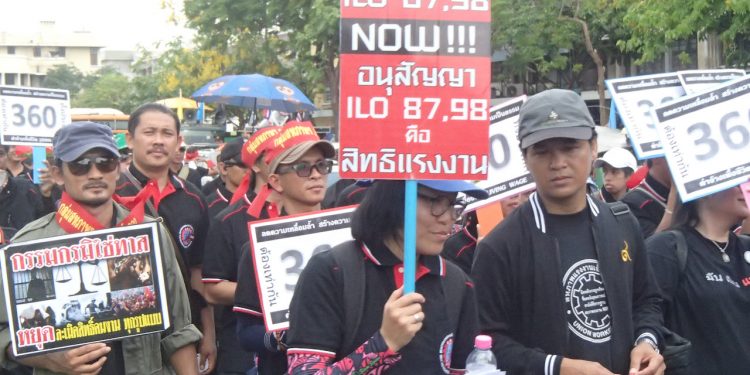Survey results released by Fishers’ Rights Network (FRN) show startling breaches of international labour laws in the Thai fishing industry, with 84% of those surveyed not allowed to keep their own documents, 87% owing money to their boat owner for ‘fees’ and 99% not being paid according to law.
Thai fishermen’s union FRN polled more than a thousand migrant fishermen during November and December 2023 regarding their working conditions in the Thai fishing industry.
‘Burmese and Khmer fishers still endure dire forced labour conditions, such as lack of adequate clean drinking water on board, limited hours of rest, debt bondage, document retention and other severe labour abuses despite Thailand having ratified C188, ILO’s Work in Fishing Convention,’ stated FRN President and former migrant fisherman Ye Thwe, demanding immediate action to enforce humane international standards.
‘It is clear from these survey results that migrant fishers endure conditions no one should have to tolerate. Human rights violations are still prevalent, and regulations are not being properly followed. We often hear from fishers who are not paid for months at a time, face dangerous conditions onboard, and are intimidated by the process to report violations.’
Ye Thwe commented that he was himself a fisherman for fifteen years – and said that little has changed.
‘Most fishers don’t have enough clean drinking water on board, have their identity documents held by their employer, and are not paid according to Thai law. Fishers face working conditions that are unsafe because they don’t have enough time to rest – increasing accidents and injuries on board,’ he said.

Commenting on the Thai Government’s failing to effectively implement and enforce provisions of the Work in Fishing Convention (C188) that Thailand ratified in 2019, Johnny Hansen, Chair of the ITF Fisheries Section commented that the results presented in this report clearly show that significant action is urgently needed to fully protect the labour and human rights of migrant fishers in Thailand.
‘When countries ratify ILO C188, it should mean that humane working conditions for fishers are effectively implemented and enforced. Current conditions demonstrate that Thai labour law and labour inspections do not meet the standards set out in the convention that should protect fishers from exploitation and labour rights abuse,’ he said.
‘Thailand has an opportunity to demonstrate leadership in the region and set an example that they are effectively ensuring Thai seafood is free from forced labour. Failing to enforce C188 puts all seafood exports from Thailand under scrutiny and casts a dark shadow over labour conditions in the industry. Violators of international labour standards should be held to account, and inspections should identify violations and correct bad behaviour – not overlook violations in an effort to report false and misleading statistics.’









